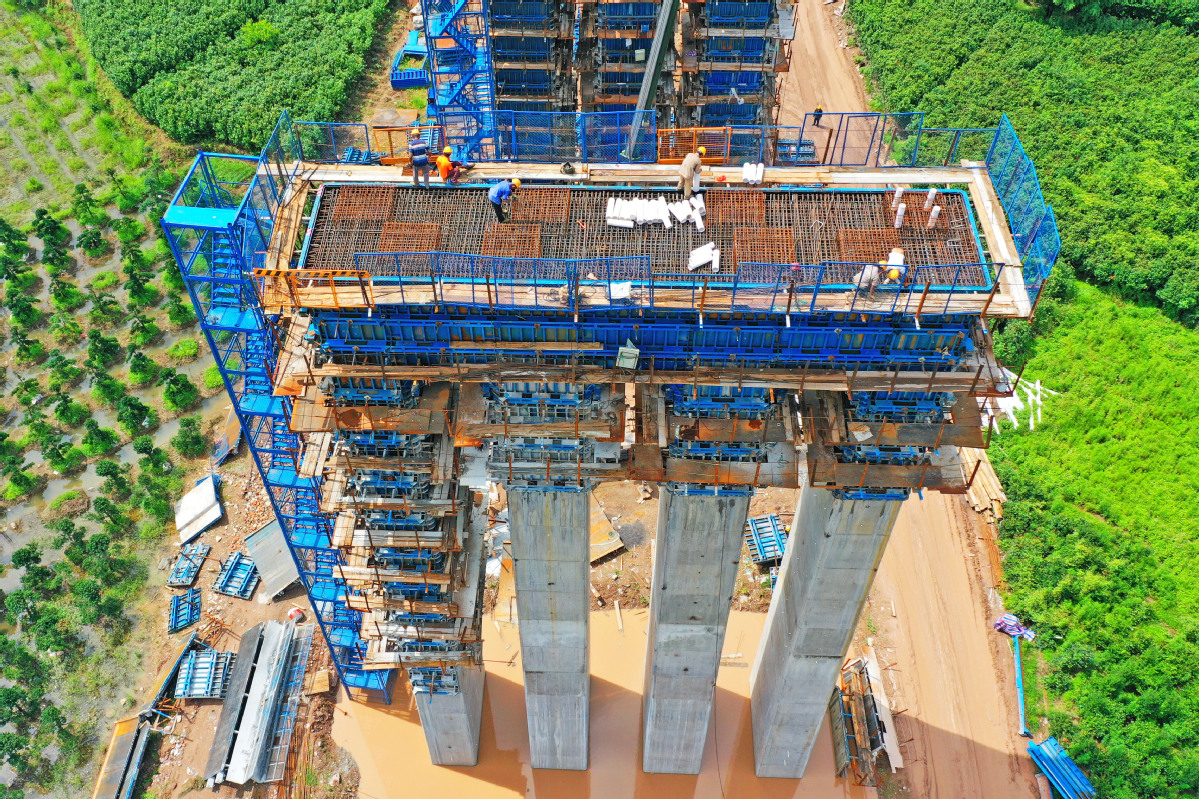REITs make substantial debut

Workers construct a railway bridge on the Hangzhou-Wenzhou high-speed railway line in Taizhou, Zhejiang province. [Photo by Wang Huabin/For China Daily]
China's ongoing capital market reforms made a breakthrough on Monday as the initial batch of public REITs, or real estate investment trusts, made a solid debut and ended in positive territory, officials and experts said.
The country's first nine publicly offered infrastructure REITs, a type of instrument that invests in in-use infrastructure projects and distributes project cash flow to investors, went public on Monday and achieved an average gain of 5.21 percent, according to information provider Wind Info.
The pilot REITs, five listed on Shanghai and four listed in Shenzhen, rose as the market opened on Monday and diverged later, closing between 14.72 percent and 0.68 percent higher.
Bosera Funds' REIT, with an industrial park based in Shenzhen, Guangdong province, as the underlying asset, has led the growth and closed at 2.65 yuan (41 cents), compared with the offer price of 2.31 yuan.
The solid market performance has demonstrated investors' interest in the new instrument that not only diversifies the pool of investment products but marks a breakthrough in China's capital market reforms that aim to strengthen support for the real economy, officials and experts said.
"The development of the country's public REITs market has made a significant step," Chen Fei, an official with the China Securities Regulatory Commission, the country's top securities regulator, said while addressing the REITs listing ceremony of the Shenzhen Stock Exchange, or the SZSE, via a video link on Monday.
The launch of REITs will help existing mobile assets and different resources to fund new infrastructure investment, supporting the upgrade of China's infrastructure industry, Chen said.
In 2007, China started to research for the launch of its REITs market and finally kicked off a pilot scheme for infra-structure REITs in April 2020. The instruments are widely found in overseas mature capital markets.
"We will focus on supporting the equity financing of assets that have mature operation, generate stable cash flow and are highly recognized by the market," he said.
The Shanghai Municipal Development and Reform Commission released a notice on Monday to develop the city into the "first-choice destination" of domestic REITs floats, while the SZSE said it will actively introduce more REIT projects and constantly improve related rules.
Yang Zhihua, deputy Party secretary and chairman of the Supervisory Board at the SZSE, said the debut of REITs is of great significance for the deepening supply-side reform of the financial system, increasing the proportion of direct financing, expanding investment channels and enhancing the ability of capital markets to serve the real economy.
Robin Xu, associate director of UBS Securities Research and head of regional industrials and infrastructure research, said many overseas institutional investors have shown great interest in China's infrastructure REITs market as the country has accumulated a large amount of in-use infrastructure with good return prospects.
"Different from many other economies, China has made a great deal of infrastructure investment over the past two decades. The launch of REITs may have created a win-win scenario where investors can receive decent returns while new infrastructure projects get funded by securitizing in-use ones," Xu said.
According to Xu, the estimated market size of qualified publicly offered infrastructure REITs in China can reach $5 trillion in the future, equivalent to about one-third of the country's GDP last year.
Compared with overseas mature markets, however, China's emerging REITs market still needs further and clearer tax incentives to thrive, and readily available English-language information disclosure and other measures to facilitate foreign investment will help turn foreign institutions' interest into real investments, he said.
Photos
Related Stories
Copyright © 2021 People's Daily Online. All Rights Reserved.










